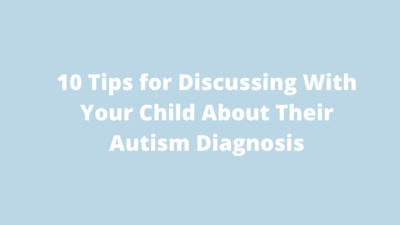I recently asked our autism community for advice for parents on discussing with their child about their autism diagnosis. I produced a video webinar you can watch on the topic here. Here’s what they had to say…
- Mine is, “You should never hide a child’s autism diagnosis. I often hear from parents “I don’t want my child to be defined by a label” as one of the main reasons I hear why parents don’t discuss an autism diagnosis with their child. Explaining to them they have autism early on can avoid any confusion or uncertainty later. Consider adding an entertainment show like PBS Kids who have multiple autistic characters as a way of starting the conversation in addition to just explaining it on a novice level. My parents said to me for example, “Kerry, you have autism but it doesn’t make you any less of a person.” I produced a video webinar on this topic you can watch for more here: https://kerrymagro.com/product/helpful-tips-for-talking-to-your-child-about-their-autism-diagnosis/ – Kerry Magro
- Rosalie suggested that there shouldn’t be a big discussion time. She says that “it should be part of everyday conversation. No shame. No taboo. It never has been in my home.”
- Parent Tessa Marie said that her “daughter was eight when she was diagnosed, and her psychologist told us to wait until she was around 13 to tell her. She was in OT and Counseling. She knew she had been tested for various things. I just told her that we were going to continue learning about how her brain works since we were still in therapies. I did say that we thought she might have Autism and explained a little about what that meant. We always focused on her strengths, but we also validated her struggles. We wanted her to know she was different, and that was a good thing! Now, she is 15, and she prefers to be called autistic. Her IG handle has the words ‘awesome spectrum,’ and she is proud of her neurodiversity. She knows we held off on telling her, and she understands. She’s amazing.”
- Many parents suggested giving children information on the diagnosis through easy-to-understand children’s books before telling them their diagnosis. This way, they have an idea of what it means instead of interpreting it as being broken or wrong.
- Danielle says: “Rip the band off. Is there ever a good time? Most kids are aware of something being different. They’re not idiots, don’t treat them like they are. Open and honest discussion”
- Julie makes a good point that, as a parent, you should be accepting of the diagnosis before you try to explain it to your child and try to get them to accept it. This way you won’t accidentally put feelings of anxiety onto your child during the conversation.
- Self-advocate and KFM intern Brielle shared her diagnosis story, stating that “I was there when the psychologist told my mom the diagnosis. I think the fact that my parents celebrated my diagnosis by taking me out for dessert helped me understand that the diagnosis wasn’t a bad thing. I would suggest celebrating your child’s differences rather than emphasizing the downsides.”
- A couple of parents pointed out their children’s therapies, and how they wanted them to know why they spent so much time with professionals. Jackie said, “he was receiving various services…speech therapy, OT, etc. so I wanted him to understand why and take it seriously.”
- It might help children to know right from the beginning, so they always know that it is a part of their life. Stefanie says, “Do it immediately in the office with the help of the diagnosing doctor. Never hide it from the child or wait until they are older. Let it be a daily discussion.”
- Multiple parents pointed out how their child wasn’t at all perturbed by the diagnosis reveal. From the words of Sandra “Kids can handle a lot more than we think. Just be prepared for the day when they ask you to explain it.” When it comes down to it, how you choose to tell your child is your choice, but remember that kids may react more positively than you expect.
What would be your advice? Tell us in the comments! You can read all the pieces of advice below…
Follow my journey on Facebook, my Facebook Fan Page, Tiktok, Youtube & Instagram,
My name is Kerry Magro, a professional speaker and best-selling author who is also on the autism spectrum that started the nonprofit KFM Making a Difference in 2011 to help students with autism receive scholarship aid to pursue a post-secondary education. Help support me so I can continue to help students with autism go to college by making a tax-deductible donation to our nonprofit here.














